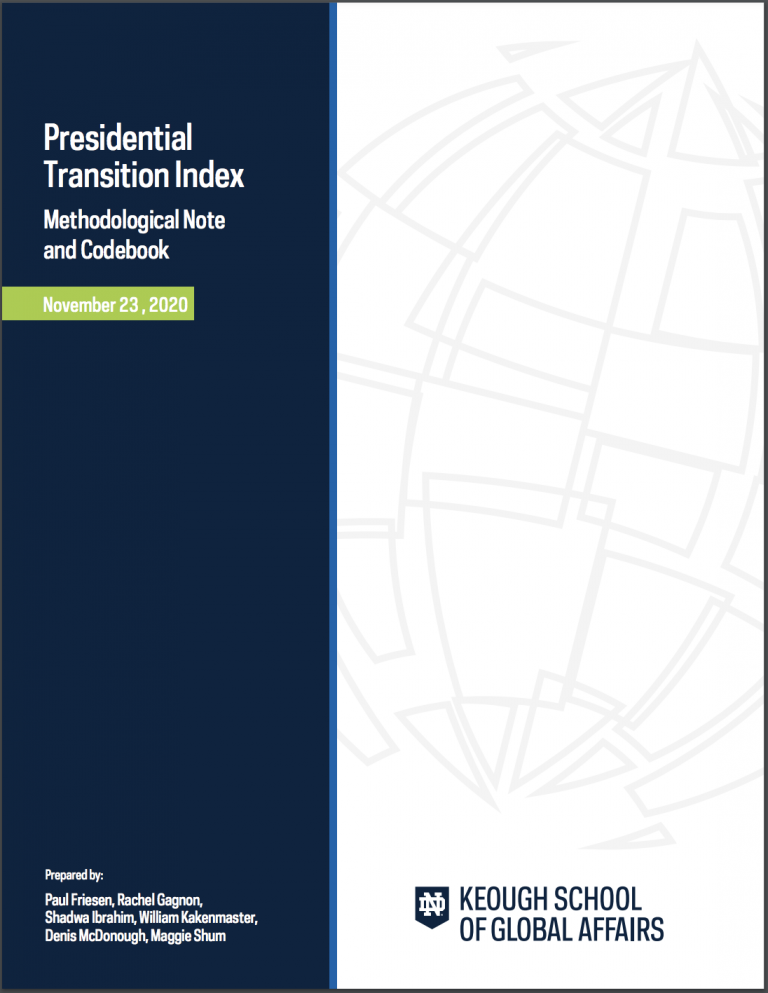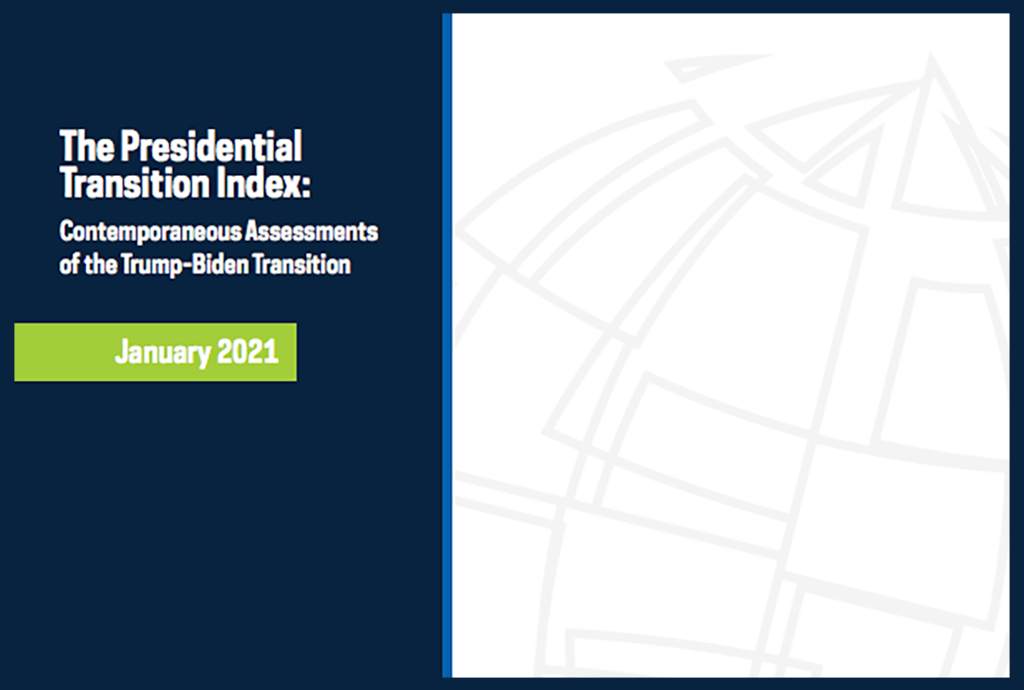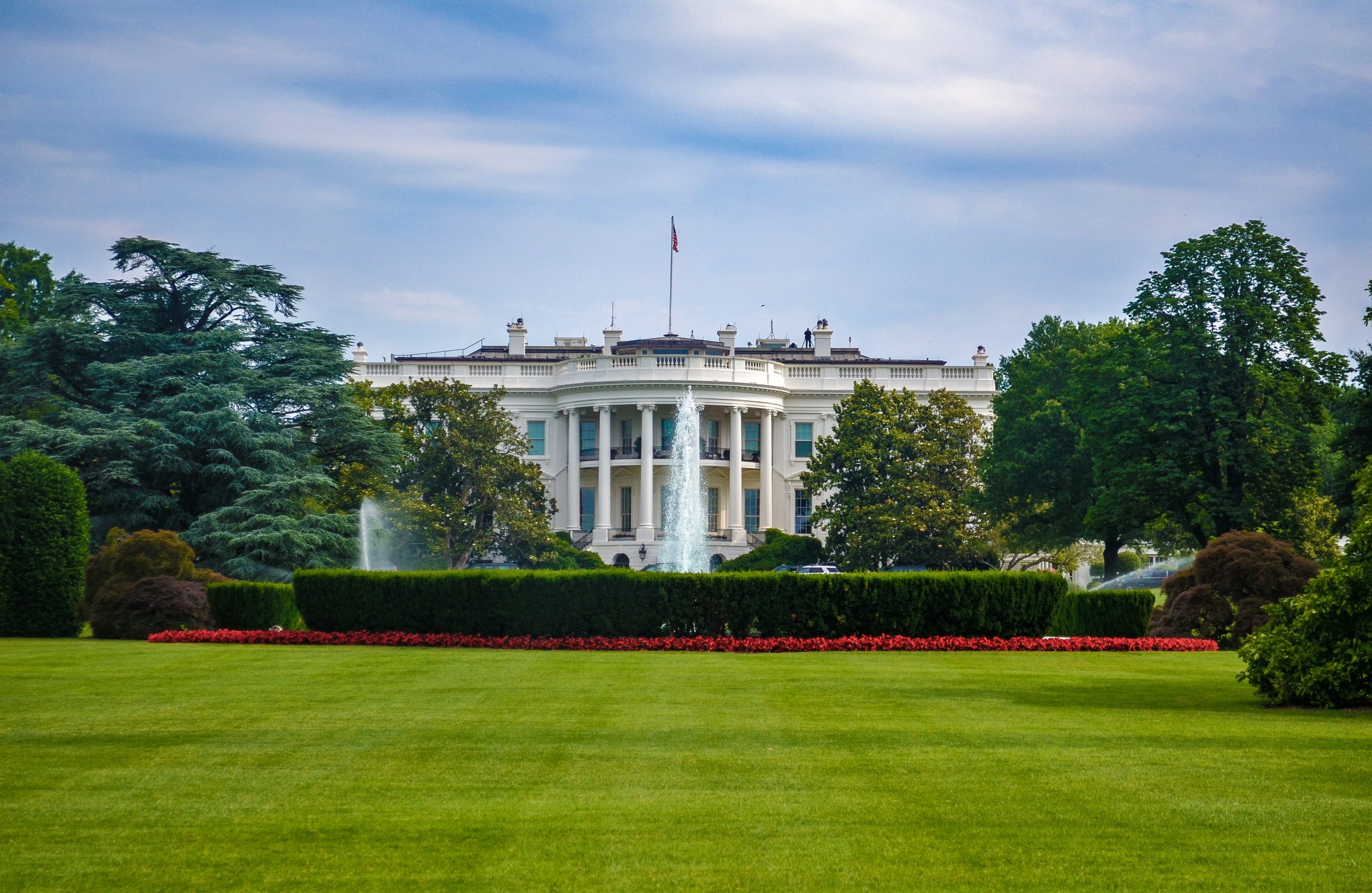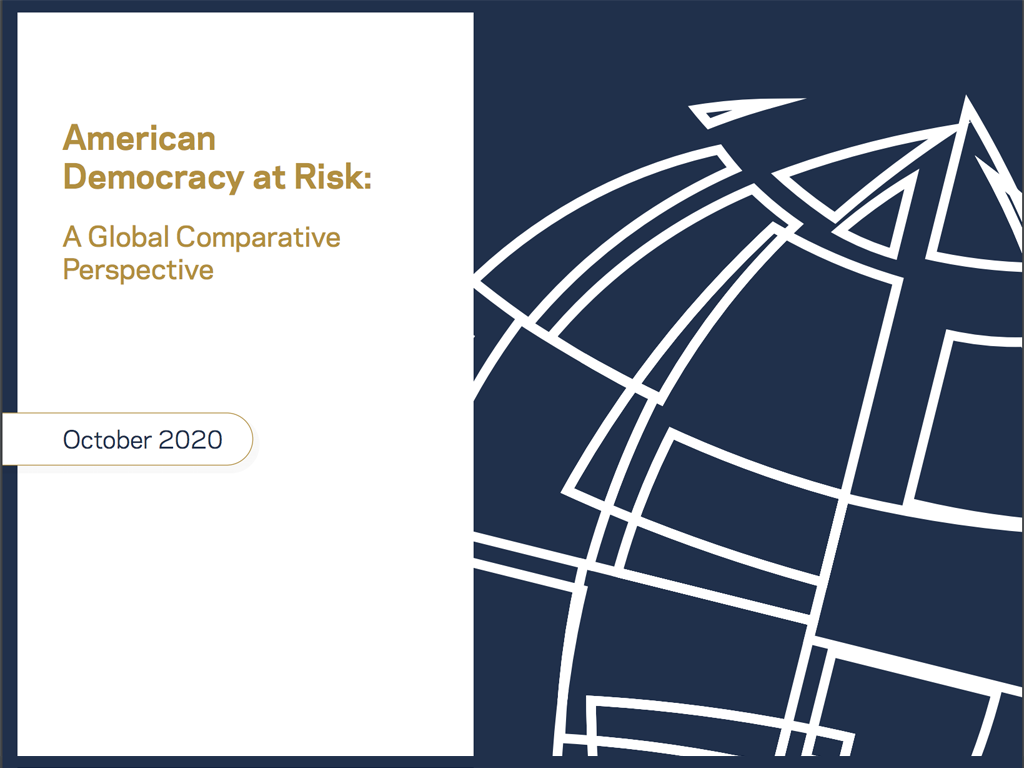2020 Presidential Transition Index
The Keough School’s Presidential Transition Index finds that Democratic and Republican transition teams fulfilled 76% of the obligations required by law for a presidential transition.
Data was collected and published from November 2, 2020 through January 18, 2021. View all weekly insights throughout the Trump-Biden transition.
Preliminary Report
The Trump-Biden transition was perhaps the most closely watched and politically fraught presidential transition in modern United States history.
As the transition concludes, a new report published by the Keough School of Global Affairs provides a timely assessment of the state of the transition and presents key findings from the Presidential Transition Index research team.
The Presidential Transition Index: Contemporaneous Assessments of the Trump-Biden Transition highlights areas of vulnerability in transition processes that could impact the health of US democracy and American lives in light of the Coronavirus pandemic. It presents several recommendations for reforming statutory requirements and strengthening democratic norms to help ensure that future transitions proceed smoothly.
Recommended Citation:
Friesen, Paul, Rachel Gagnon, Shadwa Ibrahim, William Kakenmaster, and Maggie Shum. The Presidential Transition Index: Contemporaneous Assessments of the Trump-Biden Transition. Notre Dame, IN: Keough School of Global Affairs, 2021. https://doi.org/10.7274/r0-3ym3-xw18
Transparency in governance and democracy
The Presidential Transition Index (PTI) aims to identify potentially weak areas of the presidential transition process and to provide the public with an ongoing, near real-time assessment of the 2020 transition. Housed at the University of Notre Dame’s Keough School of Global Affairs, the PTI project was initiated by former professor of the practice of public policy and former White House Chief of Staff Denis McDonough.
The PTI research team includes Paul Friesen (PhD student), Rachel Gagnon (MGA student), Shadwa Ibrahim (MGA student), William Kakenmaster (PhD student), and Maggie Shum (research associate).
“The American people have a stake in—and a right to know—how the transition from campaign to governance is being handled. This research is providing a window into this important moment in time for the American public.”
Denis McDonough
Former Professor of the Practice of Public Policy
US Secretary of Veterans Affairs and Former White House Chief of Staff
Research Methodology
A team of researchers at the University of Notre Dame’s Keough School of Global Affairs has created the Presidential Transition Index (PTI) to assess and monitor the transition process with the following objectives:
- Provide a timely and detailed assessment of the readiness and progress for a potential presidential transition as stipulated by legal statutes.
- Envision how electoral disputes may impact or stall the transition.
- Monitor the intentions of and interactions between outgoing political staff, incoming political staff, and civil servants.
- Identify areas of vulnerability in the transition process that could impact the health of US democracy and American lives in light of the pandemic.
The research utilizes a mixed-methods approach, combining a quantitative assessment of adherence to legal mandates on transition processes and a qualitative survey to assess the progress and quality of the transition from the perspective of experts.
- More information about the methodological approach is available in the attached pdf with codebook.
- A complete list of indexed variables is provided in the index tracking spreadsheet below.
Recommended citation:
2020 Presidential Transition Index, Keough School of Global Affairs, updated January 18, 2021, https://keough.nd.edu/research-policy-and-practice/global-policy-initiative/presidential-transition-index/
Presidential Transition Index Tracking Sheet
N/A: Not applicable is used to indicate variables that are included in their statutory requirements but are not chronologically applicable at the time of coding. When there is no clearly stated timeline or date, the team reviewed whether the statute could have been reasonably adhered to at the date of coding given the timeline of past transitions.
Related Resources
This project builds on the Keough School’s contributions to research, policy, and practice in democracy and human development.
Preliminary Report
The Presidential Transition Index: Contemporaneous Assessments of the Trump-Biden Transition highlights areas of vulnerability in transition processes that could impact the health of US democracy and American lives in light of the Coronavirus pandemic. It presents several recommendations for reforming statutory requirements and strengthening democratic norms to help ensure that future transitions proceed smoothly.
News Release
The University of Notre Dame issued a news release detailing the work of the Presidential Transition Index team. It provides more information about the objectives of the research project, and includes comments from former White House Chief of Staff Denis McDonough.
“The students and I decided it was important to put their classroom learning into action, addressing key questions of democracy, governance and effective institutions,” McDonough said.
Policy Paper
A recent Keough School of Global Affairs policy paper, American Democracy at Risk: A Global Comparative Perspective, highlights several dangerous scenarios and risks in the 2020 election, and identifies strategies to safeguard American democracy.
The report, which draws on a recent survey of international election experts, sheds light on American democracy and elections in a global context. It provides recommendations for longer-term structural reforms and policy changes that could help reduce future electoral risks and enhance voting access and security in the United States.
ARVE Error: No oembed html
Webinar Discussion
In a recent panel discussion, global elections experts highlighted steps that voters, media, and institutions can take to mitigate an electoral crisis before, during and after the 2020 election.
Panelists included University of Notre Dame professors Abby Córdova and David Cortright, along with Paul Friesen (PhD student), Bishara Ali Mohamed (MGA student), and Maggie Shum (research associate).



